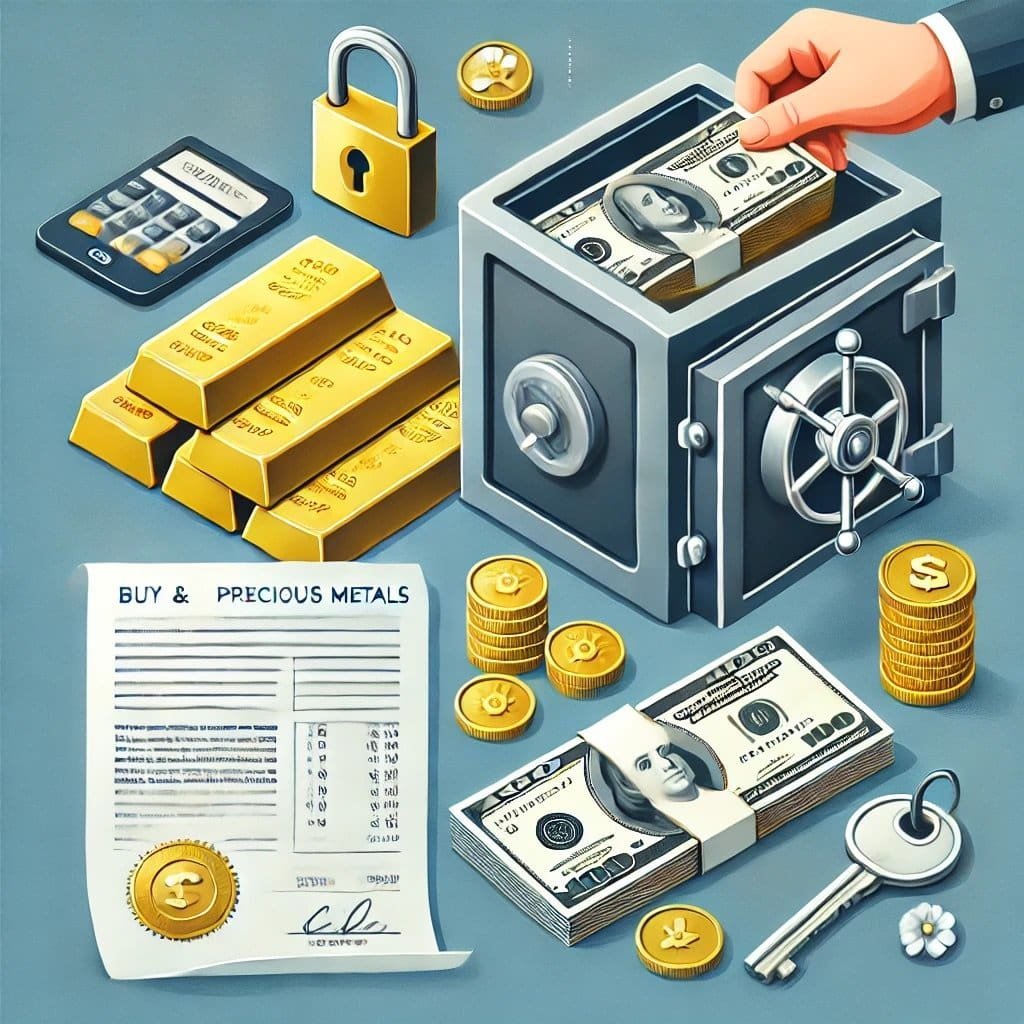Investing in physical precious metals like gold, silver, platinum, and palladium can be a wise strategy for diversifying your portfolio and protecting your wealth. However, buying and storing these assets safely is crucial to ensure their value is preserved and accessible when needed. Here’s a comprehensive guide on how to purchase and securely store physical precious metals.
1. Buying Physical Precious Metals
When buying physical precious metals, it’s important to choose reputable dealers and understand the different forms of metals available.
Forms of Precious Metals:
• Bullion Bars: These are pure metal bars, typically available in weights ranging from one gram to one kilogram or more. Bullion bars are valued based on their weight and purity.
• Coins: Gold and silver coins, such as the American Gold Eagle or Canadian Silver Maple Leaf, are popular among investors. Coins often have a slightly higher premium than bars due to their collectible value.
• Rounds: These are similar to coins but are not legal tender. They are often used for investment purposes and are valued based on their metal content.
• Jewelry: Although less common as an investment, gold and silver jewelry can also be a way to hold physical metals. However, jewelry often carries a significant markup over the metal’s intrinsic value.
Steps to Buy Safely:
• Research Reputable Dealers: Look for established dealers with strong reputations and transparent pricing. Online dealers like JM Bullion, APMEX, and local precious metals shops are good options. Ensure the dealer provides authentication and a buyback guarantee.
• Understand Pricing: Precious metals are typically sold at a premium above the spot price. The premium covers production, distribution, and dealer profit. Compare prices across dealers to ensure you’re getting a fair deal.
• Check Purity and Weight: Always verify the purity and weight of the metal. Gold should typically be 99.9% pure (24 karats), while silver is often 99.9% pure as well.
• Get a Certificate of Authenticity: When purchasing physical metals, ask for a certificate of authenticity, which verifies the metal’s purity and weight.
2. Storing Physical Precious Metals Safely
Once you’ve purchased your precious metals, proper storage is essential to protect them from theft, damage, and loss.
Storage Options:
• Home Safe: A high-quality, fireproof safe is a convenient option for storing small amounts of precious metals at home. The safe should be securely bolted to the floor or wall and kept in a discreet location.
• Pros: Immediate access, no storage fees.
• Cons: Risk of theft, limited insurance coverage.
• Bank Safe Deposit Box: Storing your metals in a bank safe deposit box offers a high level of security, as banks typically have robust security measures in place.
• Pros: Secure, off-site storage, insured by the bank (though limits apply).
• Cons: Limited access (during bank hours), potential fees.
• Professional Vault Storage: Third-party storage facilities, often called depositories, specialize in storing precious metals. These facilities offer high-security vaults, insurance, and sometimes even online account management.
• Pros: Maximum security, fully insured, 24/7 access (online).
• Cons: Storage fees, no immediate physical access.
• Diversified Storage: For added security, consider splitting your precious metals between home storage, a bank, and a professional vault. This approach spreads the risk and ensures you have access in multiple scenarios.
Best Practices for Storage:
• Insure Your Metals: Regardless of where you store your metals, ensure they are fully insured. Homeowners’ insurance often provides limited coverage, so consider a separate policy if storing at home.
• Keep Records: Maintain detailed records of your purchases, including receipts, certificates of authenticity, and photos of your metals. This documentation is crucial for insurance claims and verifying ownership.
• Regularly Audit Your Holdings: Periodically check your metals to ensure they are intact and secure. If using a third-party vault, request an audit or verification statement.
3. Securing Your Precious Metals Investment
To protect your investment, follow these security tips:
• Discretion: Keep your investment private. Avoid discussing your holdings with others, and be discreet when purchasing or transporting metals.
• Monitor Market Conditions: Stay informed about the market value of your metals. Knowing the current prices can help you make informed decisions about buying, selling, or holding.
• Plan for the Future: Consider what will happen to your metals in the event of your death. Include them in your estate plan, and make sure your heirs know how to access and manage them.
Conclusion
Buying and storing physical precious metals safely requires careful planning and consideration. By choosing reputable dealers, understanding pricing, and securing proper storage, you can protect your investment and ensure that your precious metals remain a valuable part of your portfolio. Whether you store your metals at home, in a bank, or in a professional vault, the key is to prioritize security and accessibility to safeguard your wealth.



2 comments